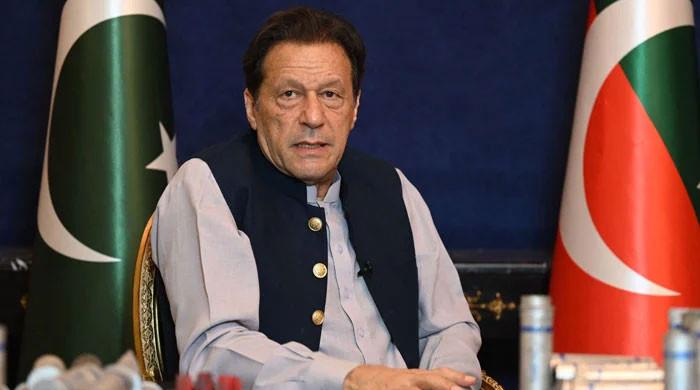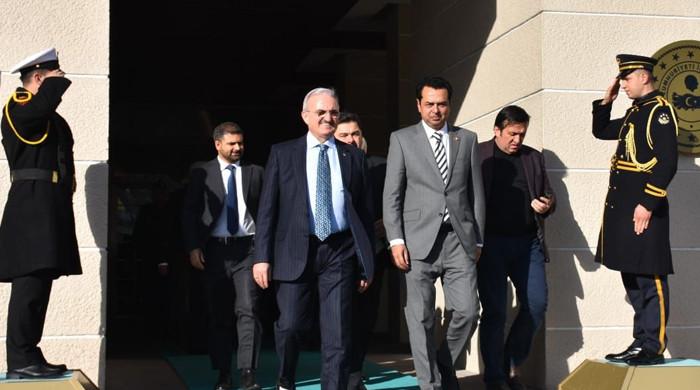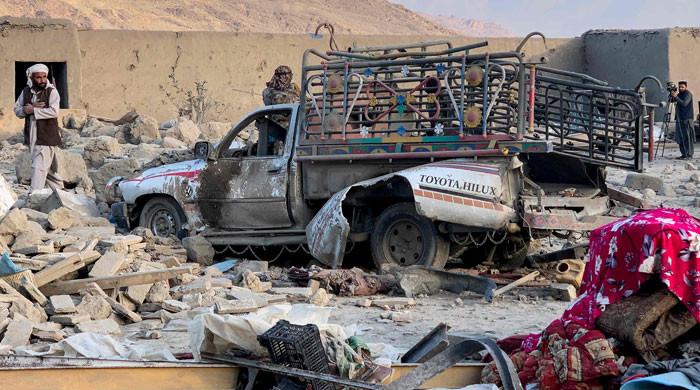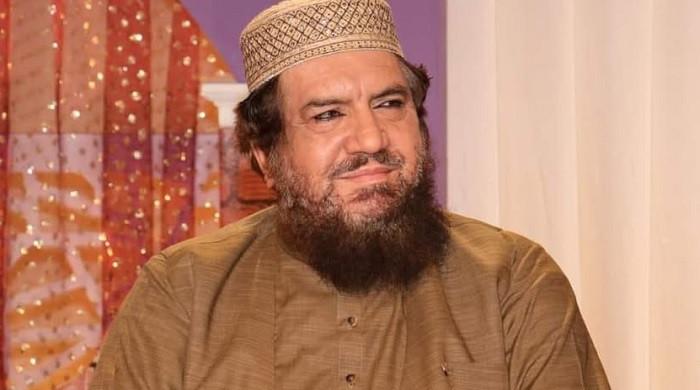Field Marshal Munir, PCC CEO discuss digital future at GHQ
Meeting highlights national push to empower youth with blockchain and AI tools
May 23, 2025
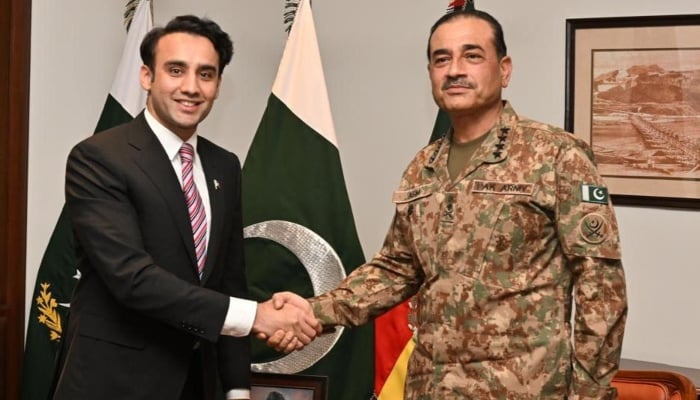
RAWALPINDI: In a high-level meeting at General Headquarters (GHQ), Pakistan’s Chief of Army Staff, Field Marshal Asim Munir, met Bilal Bin Saqib, CEO of the Pakistan Crypto Council (PCC).
The two discussed the future of the country’s digital economy, with a core focus on empowering the youth through blockchain, cryptocurrency, and artificial intelligence.
The meeting underscored a growing national commitment to emerging technologies as a pathway for economic resilience and global relevance. Central to the discussion was the belief that Pakistan’s youth must be at the heart of this transformation.
“The Pakistan Crypto Council exists because our youth demand a seat at the global tech table,” said Saqib. “We are building for a generation that sees digital finance, decentralisation, and AI not as threats—but as opportunities to lead, innovate, and uplift the nation.”
Saqib shared key updates on PCC’s progress, including the visit of the delegation of World Liberty Financial and Founder of Binance, Changpeng Zhao, regulatory consultations, international collaboration, and youth-focused approach to create a digitally skilled and globally competitive generation.
He outlined a forward-looking roadmap that aims to accelerate innovation and unlock widespread opportunity in Pakistan’s growing digital financial ecosystem.
In a key development aligned with these efforts, the Ministry of Finance on Wednesday unveiled a comprehensive strategy to regulate digital assets and accelerate the growth of Pakistan’s virtual asset economy.
As part of this initiative, the government has endorsed the creation of a dedicated body — the Pakistan Digital Assets Authority (PDAA) — tasked with overseeing blockchain-based financial infrastructure, according to an official statement released by the Ministry.
Federal Finance Minister Muhammad Aurangzeb stated: “Pakistan stands at the threshold of a digital transformation. With the establishment of the Pakistan Digital Assets Authority (PDAA), we are committed to creating a secure, innovative, and inclusive ecosystem for virtual assets."
"Our vision is to position Pakistan as a regional leader in blockchain regulation, digital finance, and responsible innovation that empowers our youth and attracts global investment,” he added.
The PDAA is expected to regulate a $300 billion informal crypto market, facilitate the tokenisation of national assets and government debt, provide legal clarity to global and local investors, and enable monetisation of Pakistan’s surplus electricity through regulated Bitcoin mining.
Additionally, the authority aims to promote best practices for innovation, ensure economic inclusion, and empower youth and startups to build blockchain-based solutions at scale.
As part of the broader national strategy, Pakistan also plans to allocate part of its surplus electricity to Bitcoin mining and AI data centres, positioning itself as a regional hub for digital infrastructure.
This engagement comes just ahead of Saqib’s departure for the Bitcoin 2025 Conference in Las Vegas, where he will speak on stage alongside global leaders in cryptocurrency, blockchain infrastructure, and AI.
The event is set to feature high-profile participants including US Vice President JD Vance, Eric Trump, Donald Trump Jr, Bo Hines, Executive Director of the Presidential Council of Advisers on Digital Assets; David Sacks, The White House AI and Crypto Czar; Michael Saylor, Executive Chairman and Co-Founder of MicroStrategy; Senator Cynthia Lummis, US Senate; and Bryan Steil, Member of Congress, US House of Representatives.
“With the support of national leadership, we are now moving decisively,” Saqib said. “Pakistan’s youth are not just future participants—they are today’s drivers of change. Our mission is to give them the tools, education, and platforms to lead globally,” he added.
The Pakistan Crypto Council continues to operate as a national force for crypto policy, innovation, youth empowerment, and international engagement in crypto and blockchain.
Pakistan is home to over 50 million crypto users, with an annual trading volume exceeding $300 billion. The country consistently ranks in the top 5 globally for crypto adoption, reflecting its strong grassroots engagement with digital assets. Out of a population of 240 million, 70% of Pakistanis are under the age of 30.
Pakistan boasts a highly favourable demographic for widespread crypto adoption, making it one of the most promising emerging markets for blockchain and digital finance innovation. Pakistan is also the third-largest freelancer market in the world, showcasing its dynamic and entrepreneurial digital workforce.
Each year, over 50,000 IT graduates enter the workforce, adding to the country’s growing pool of tech-savvy youth ready to drive innovation and participate in the global digital economy.
Pakistan’s new crypto council attracts Binance founder, Trump administration-linked partners
The Pakistan Crypto Council (PCC), launched on March 14, 2025, has announced several strategic partnerships and regulatory initiatives as the country seeks to establish a framework for digital asset oversight.
The council has appointed Changpeng Zhao, founder of cryptocurrency exchange Binance, as a strategic advisor. Zhao previously served as CEO of Binance before stepping down in 2023 as part of a plea agreement with US regulators.
The PCC has also signed a letter of intent with World Liberty Financial, a blockchain project that has received backing from figures associated with the Trump administration. The agreement includes Zachary Witkoff, whose father, Steve Witkoff, served in diplomatic roles during Trump's previous presidency.
PCC CEO Bilal Bin Saqib met with Malaysian Foreign Minister Mohamad bin Hajji Hasan to discuss potential collaboration on blockchain technology and digital finance frameworks that would comply with both Financial Action Task Force (FATF) guidelines and Islamic finance principles.
The discussions centred on establishing what officials are calling a “Pakistan-Malaysia Digital Finance Partnership”, focused on developing regulatory frameworks for digital assets.
Pakistan’s Ministry of Finance has announced plans to create the Pakistan Digital Assets Authority (PDAA), a dedicated regulatory body for blockchain-based financial infrastructure. The authority would oversee what the ministry describes as a significant informal cryptocurrency market within the country. The proposed framework aims to address anti-money laundering and know-your-customer requirements while providing regulatory clarity for digital asset operations.
The council is also exploring opportunities to utilise Pakistan’s electricity surplus for cryptocurrency mining operations and is in discussions with firms interested in establishing data centers and mining facilities.
Officials are also examining the potential for tokenising real-world assets, including land and commodities, though specific timelines and implementation details have not been disclosed.
Justin Sun, founder of the TRON blockchain network, has reportedly accepted an invitation to visit Pakistan, according to PCC statements.
Bilalis scheduled to speak at the Bitcoin 2025 Conference in Las Vegas, where he will join other industry figures and US political leaders.
Pakistan has a significant cryptocurrency user base, with the country consistently ranking among the top nations for crypto adoption in various industry surveys. The country's young population and growing IT sector have contributed to this digital asset engagement.
The regulatory developments come as other countries in the region, including India, have implemented varying approaches to cryptocurrency oversight, from taxation measures to restrictions on certain activities.




